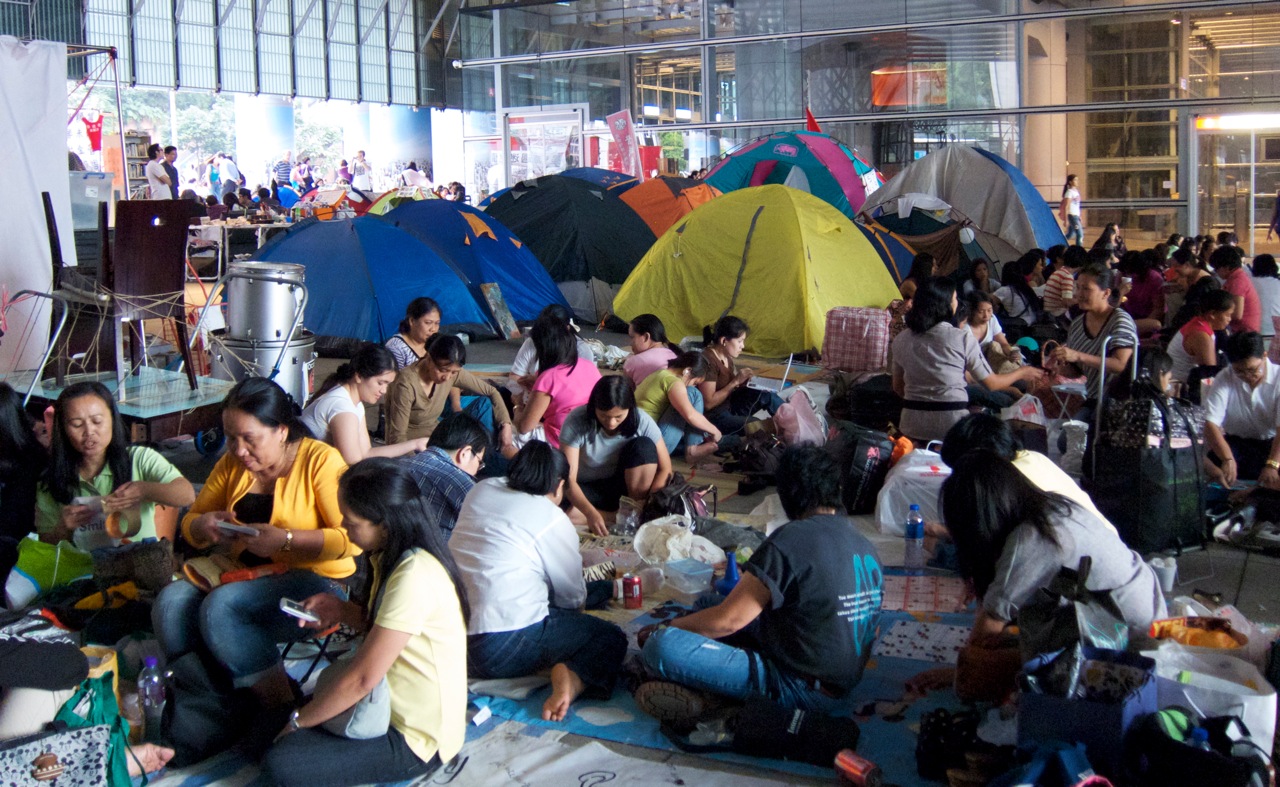Foreign scholars: Occupy Central hurts Hong Kong economy

A group of protestors from Occupy Central movement blocks a walkway in Hong Kong.
The Occupy Central demonstrations that have disrupted activities in Hong Kong’s tourism and financial districts for nearly two months have taken a toll on the special administrative region’s economy, foreign economists say.
Tim Condon, a chief economist of International Netherlands Group, said the protests have had a negative effect on Hong Kong’s economic growth in the third quarter, a time when the retail industry usually sees a boom from mainland tourism.
In October each year, tourists from the Chinese mainland flock to Hong Kong to spend their National Day holiday, making it a particularly important month for the local retail industry. But this year, retail establishments took a hit from the demonstrations, Condon said.
Chris Leung, a senior economist of the Development Bank of Singapore, said that the decline in Hong Kong retail revenue also had an impact on the amount of rent paid by stores, negatively affecting the real estate industry as well.
Raymond Yeung, a senior economist of the Australia and New Zealand Bank agreed, saying that the political strife in the city has added “insult to injury” for the retail sector.
Occupy Central severely damaged the tourism industry, one of the mainstays of Hong Kong economy. Chris Leung said if Hong Kong economy would get better by the end of October, the annual growth rate of the region’s GDP for 2014 is expected to decline to between 1.6 percent to 2.1 percent, which is stilllower than the number predicted before the movement broke out.
Still ongoing, the Occupy Central protest not only affects a wide range of businesses in many of Hong Kong’s sectors but also threatens to harm its economic cooperation with other international metropolis. In an interview with Radio télévision Suisse, John Plassard, the vice-CEO of Mirabaud securities, Switzerland, said that the persistence of the Occupy Central movement will greatly affect Hong Kong and the Chinese mainland’s economies, which are interdependent on each other.
The protest also undermines Hong Kong’s role as the first major offshore center of RMB. From the perspective of trade logistics, geographical position and financial system, Hong Kong is obviously advantageous as a city for offshore RMB banking business to be conducted. Few other regions are able to compete with it in this respect. However, the Occupy Central movement is causing Hong Kong to lose its competitive edge, giving an advantage to Singapore.
Some UK scholars said that once the international community loses confidence in the economic environment of Hong Kong, there is a risk that incalculable losses can occur in a short period of time. The damage that Occupy Central has caused is not merely on the economy but also on the social cohesiveness of Hong Kong, Chris Leung said.
After all, social economy and people’s livelihoods are what Occupy Central ultimately impairs, some scholars added, arguing that dialogues would be far better than antagonism.
Hong Kong needs to seek common development with the Chinese mainland, said Martin Jacques, a senior research fellow from Cambridge University, in a recent column for the Guardian titled “China is Hong Kong’s future, not its enemy.”
For the past 30 years, China’s social governance system has made notable achievements. China has accomplished great economic transformation in modern history. Therefore, support from the Chinese mainland is indispensible for Hong Kong, Jacques concluded.
The Chinese version appeared in Chinese Social Sciences Today, No.663, October 31, 2014.
Edited and translated by Bai Le
Revised by Jusin Ward
The Chinese link:
http://sscp.cssn.cn/xkpd/xszx/gj/201410/t20141031_1383122.html
